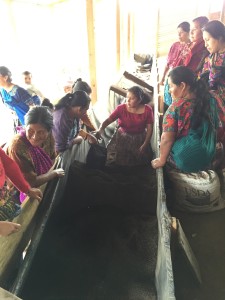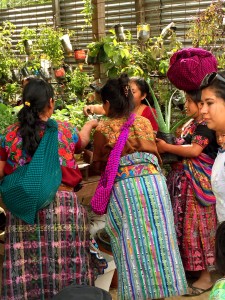8 July 2015
For the past two weeks, we’ve been under the guidance of Jose who is a fairly new employee at ByoEarth. He was raised on a coffee farm and left home at the age of 10 to live in Guatemala City. He’s worked and been mostly on his own since then. Now, he is the first person in his family to go to college, has a successful career, and is one of the most resourceful and creative people you will ever meet. We’ve gotten along incredibly well with him since our first day. We talk about almost everything during work and on the rides to and from there. He tells us a lot about his life and we try to teach him a little bit of English.
Maria, the founder and leader of ByoEarth, was on a business trip for the first two weeks of our project so we had spent very little time with her. This Monday, we had a long meeting with Maria during which we got most of our questions answered and rearranged our plan for the rest of our time here. We are planning change our schedule a bit so that we can spend more time at the Sumpango cooperativa in order to account for all the changes.
On Tuesday, we worked on clearing up the rest of the land for the beds and and moved around a lot of rock. We also spent some time with the worms since Maria brought a new batch for the women. We gave a workshop on basil that was intended to give the women a background on the diverse uses for basil and different market strategies for finding customers and selling their basil.
On Wednesday the interns split up. Raphael, Edgar and Marvin stayed at the Sumpango Cooperativa to start building the garden beds while Cintia, Reyna, and I went to a rural community nearby. There we helped Maria give a vermicompost workshop to a group of twelve women. The women are part of an organization called Puente de Amistad or Friendship Bridge. Puente de Amistad provides microloans to women to help them start their own businesses. The women have all invested their money in different projects some have started growing organic herbs and produce, others started tortilla stands, some started raising chickens, and others started beekeeping. One condition of the microloans is that they attend a series of skills transferring workshops on a variety of topics. We were lucky enough to have the opportunity to help provide a vermiculture and vermicompost workshop. During the workshop, we introduced the concept of using California red worms to produce organic fertilizer. Maria explained how to feed and care for the worms so that they reproduce and produce large amounts of high quality fertilizer. Each woman took home their own bin with worms and compost so that they can start caring for their own worms and producing fertilizer.They can use the fertilizer to support their own gardens and they can sell it. Once they have enough worms, they can even start selling those too!
After the workshop, we took the women from Puente to visit the Sumpango Cooperativa so that they could see the progress they’ve made there with the vermicomposting. The women from the cooperativa gave the women from Puente a tour of the space that they have been working in. They started by showing them the herbs in the plant nursery that they have (including some of the plants that last year’s project team helped plant). We were excited that they explained what we had gone over during Tuesday’s basil workshop! Then they gave a tour of the worm cribs and explained the system they use. Several women from Puente even bought some herbs and fertilizer from the cooperativa!



On Thursday, we started working on the irrigation system at the Sumpango cooperativa and continued constructing the garden beds. Since the women all work other jobs, they can only make it to the cooperativa on Tuesdays and Wednesdays so we sadly had to work without them and we missed them so much! On our way there, we had to take a major detour since the roads were blocked due to a political protest, or manifestacion. There have been quite a few of those recently in response to the scandal that the Vice President was involved in earlier this year and the upcoming elections.
We took a bus bright and early on Friday morning to meet Jose and Maria in the city so that we could travel to Santa Rosa where Byoearth has been helping Hunger Relief International build organic gardens for eight different families. The gardens will help provide food security for this community with limited access to nutritious foods. In addition to being a food desert year round, Santa Rosa also struggles to access clean water during the dry season and the community is reliant on government issued water supplies once a week or they collect water from the nearby river. Hunger Relief International has already started providing meals for children in school, chickens for families, and other resources to address malnutrition.
We played a few games to get to know the community better after we were greeted by kind, inspiring words from Edgar, one of the residents who will benefit from the gardens. After our introductions, we spent some time getting tours of some of the homes where we will be constructing the gardens. We learned about the plants the families grow and the animals that they tend to. We are looking forward to getting to work in Santa Rosa next week!
Written by Wendy Renteria
Photos by Edgar Martinez
